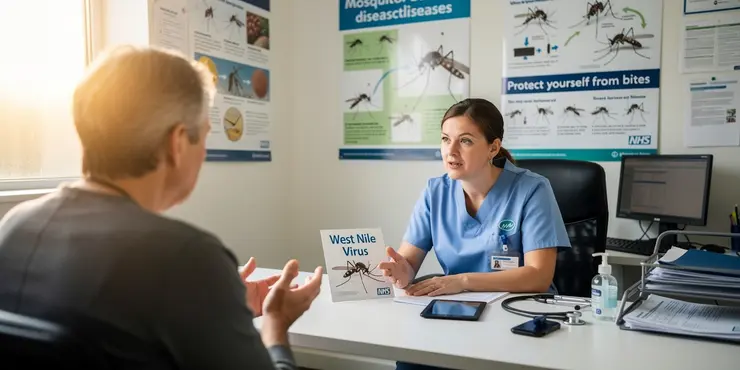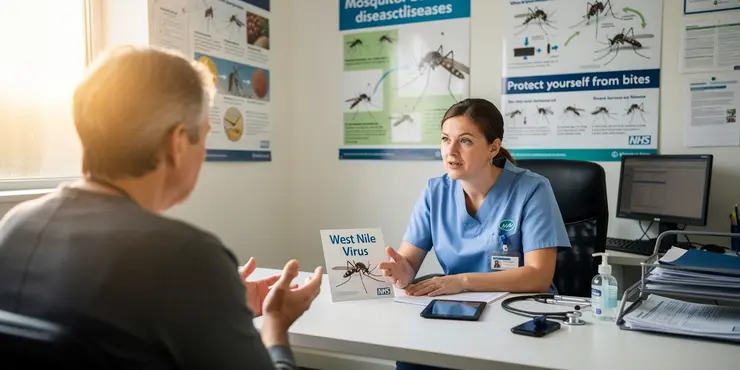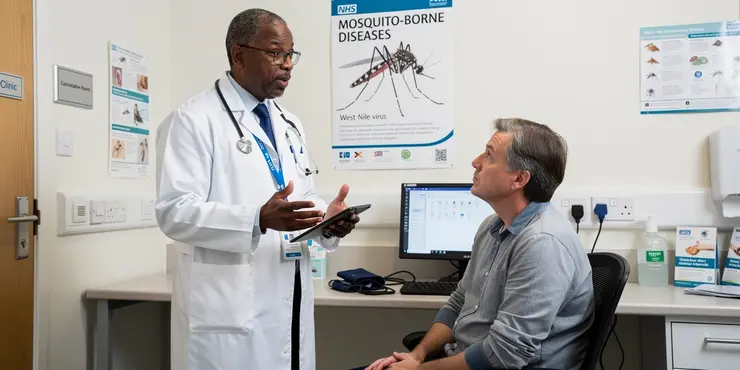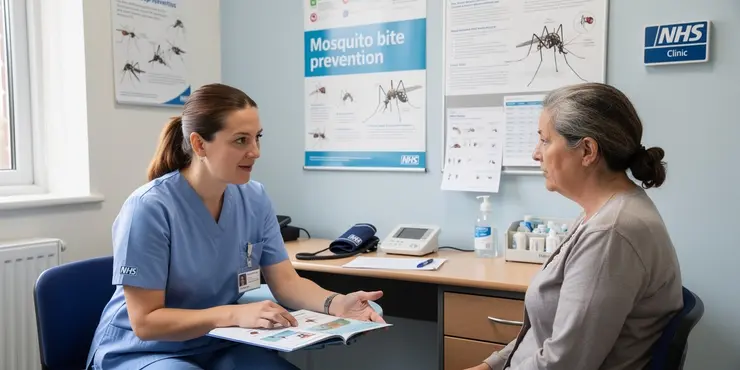
Find Help
More Items From Ergsy search
-

What is West Nile Virus?
Relevance: 100%
-

What is West Nile Virus?
Relevance: 99%
-

Is there a vaccine for West Nile Virus?
Relevance: 99%
-

Are there treatments for West Nile Virus?
Relevance: 98%
-

Is there a test for West Nile Virus?
Relevance: 98%
-

How is West Nile Virus transmitted?
Relevance: 96%
-

What are the symptoms of West Nile Virus?
Relevance: 95%
-

How prevalent is West Nile virus in the UK?
Relevance: 95%
-

Which countries are affected by West Nile Virus?
Relevance: 94%
-

Can pets get West Nile Virus?
Relevance: 93%
-

What should I do if I think I have West Nile Virus?
Relevance: 89%
-

How do health officials monitor West Nile Virus?
Relevance: 88%
-

Who is at risk for severe illness from West Nile Virus?
Relevance: 87%
-

How can West Nile Virus be prevented?
Relevance: 62%
-

Can mosquitoes carrying West Nile Virus be controlled?
Relevance: 61%
-

Can you get West Nile Virus more than once?
Relevance: 59%
-

What other viruses are tested for in blood donations?
Relevance: 49%
-

Are UK mosquitoes capable of transmitting Zika virus?
Relevance: 43%
-

What diseases are spread by mosquitos in the UK in 2025?
Relevance: 40%
-

When is West Nile Virus most active?
Relevance: 40%
-

Can West Nile Virus be transmitted from person to person?
Relevance: 35%
-

Is the Marburg virus related to the Ebola virus?
Relevance: 35%
-

What is the Ebola virus?
Relevance: 32%
-

Can West Nile Virus spread through blood transfusions or organ transplants?
Relevance: 31%
-
Do all mosquitoes in the UK carry diseases?
Relevance: 30%
-

What regions of the UK are most affected by mosquito-borne diseases?
Relevance: 27%
-

Is there a cure for Nipah Virus?
Relevance: 25%
-

What is Nipah Virus?
Relevance: 25%
-

What is the Marburg Virus?
Relevance: 25%
-

Is there a vaccine for Marburg virus?
Relevance: 25%
-

Is there a vaccine for the Zika virus?
Relevance: 25%
-

Is Zika virus present in the UK?
Relevance: 25%
-

How is the Zika virus transmitted?
Relevance: 24%
-

How is Nipah Virus diagnosed?
Relevance: 24%
-

How is the Marburg virus transmitted?
Relevance: 24%
-

How is Nipah Virus transmitted?
Relevance: 24%
-

Does the UK have Zika virus?
Relevance: 24%
-

How is Chikungunya virus transmitted?
Relevance: 24%
-

What are the symptoms of Zika virus?
Relevance: 24%
-

What symptoms should I watch for if I suspect a mosquito-borne disease?
Relevance: 24%
Overview of West Nile Virus
West Nile Virus (WNV) is a mosquito-borne virus that can cause serious illness in humans, birds, horses, and some other animals. It was first identified in the West Nile region of Uganda in 1937. Since then, it has spread to various parts of the world, including Europe, North America, and the Middle East. WNV is a member of the Flavivirus genus, which includes other viruses such as Zika and dengue.
Transmission
The primary mode of transmission for West Nile Virus is through the bite of an infected mosquito. Mosquitoes become carriers of the virus when they feed on infected birds, which are considered the primary hosts. In rare cases, WNV can be transmitted through blood transfusions, organ transplants, or from mother to baby during pregnancy, delivery, or breastfeeding. It is important to note that WNV is not transmitted through casual contact with infected individuals.
Symptoms and Health Effects
Most people infected with West Nile Virus do not exhibit any symptoms. However, approximately 20% of infected individuals may develop mild symptoms, including fever, headache, body aches, nausea, vomiting, and swollen lymph glands. These symptoms typically last for a few days to a week. More serious cases can lead to neurological diseases such as meningitis or encephalitis, which are inflammations of the brain and its surrounding tissues. Symptoms of severe cases may include high fever, severe headache, neck stiffness, disorientation, coma, tremors, seizures, or paralysis. People over 50 or those with weakened immune systems are at a higher risk of developing severe symptoms.
Prevention and Control
There is currently no vaccine or specific antiviral treatment for West Nile Virus in humans. Therefore, prevention focuses on reducing mosquito bites and controlling mosquito populations. Individuals can minimize exposure by using insect repellent, wearing long-sleeved clothing, and using screens on windows and doors. Eliminating standing water around residential areas can also help reduce mosquito breeding sites. Local health authorities often conduct mosquito control programs, especially during peak mosquito activity periods.
West Nile Virus in the UK
As of now, West Nile Virus is not a significant concern in the UK, with no locally-acquired cases reported. However, surveillance efforts are in place to monitor potential incursions of the virus, especially due to the possibility of infected birds or mosquitoes entering the country. Public health authorities remain vigilant and work with international partners to ensure that any emerging threats are swiftly addressed.
What is West Nile Virus?
West Nile Virus is a sickness that spreads through mosquito bites. It can make people, birds, horses, and some other animals very sick. Scientists found the virus in Uganda in 1937. Now, it is in other places like Europe, North America, and the Middle East. The virus is in a group that also has other sicknesses like Zika and dengue.
How Does it Spread?
West Nile Virus spreads mostly when a mosquito with the virus bites someone. Mosquitoes get the virus from biting sick birds. Sometimes, people can get it from blood donations, organ swaps, or from mother to baby. But you can’t catch it from just being around sick people.
What are the Symptoms?
Most people with West Nile Virus don’t feel sick at all. About 20% might feel a little sick with a fever, headache, body aches, and swollen glands. These feelings usually go away in a few days to a week. Some people get very sick. They might have problems with their brain, like meningitis or encephalitis, which make the brain swollen. People over 50 or with weak bodies are more likely to get really sick.
How to Stay Safe?
There is no shot or special medicine for West Nile Virus yet. So, it’s best to stop mosquito bites. Use bug spray, wear clothes that cover your skin, and keep windows and doors closed with screens. Get rid of water where mosquitoes can breed. Health workers help control mosquitoes, especially when there are a lot around.
West Nile Virus in the UK
Right now, West Nile Virus is not a big worry in the UK. There have been no local cases. But people are watching out to see if infected birds or mosquitoes come into the UK. Health officials check for the virus and work with other countries to keep everyone safe.
Frequently Asked Questions
What is West Nile Virus?
West Nile Virus (WNV) is a virus most commonly spread to people by mosquito bites. It is a member of the flavivirus genus and is related to the viruses that cause Japanese encephalitis and dengue fever.
How is West Nile Virus transmitted?
West Nile Virus is primarily transmitted through the bite of an infected mosquito. Mosquitoes become infected when they feed on birds carrying the virus.
What are the symptoms of West Nile Virus?
Most people infected with West Nile Virus do not have symptoms. About 1 in 5 people develop a fever with other symptoms such as headache, body aches, joint pains, vomiting, diarrhea, or rash.
Can West Nile Virus cause serious illness?
Yes, in rare cases, West Nile Virus can cause serious neurological illnesses such as encephalitis or meningitis, which are inflammation of the brain or surrounding tissues.
Who is at risk for severe illness from West Nile Virus?
People over 60 years of age, and those with certain medical conditions like cancer, diabetes, hypertension, kidney disease, and organ transplants are at greater risk of serious illness.
How is West Nile Virus diagnosed?
West Nile Virus is diagnosed through a combination of clinical evaluation and laboratory testing, often performed by testing serum or cerebral spinal fluid for WNV-specific IgM antibodies.
Is there a vaccine for West Nile Virus?
Currently, there is no vaccine available for West Nile Virus for humans, although research is ongoing. Vaccines are available for horses.
How can I prevent West Nile Virus?
Preventing mosquito bites is the best way to avoid West Nile Virus. Use insect repellent, wear long sleeves and pants, and eliminate standing water where mosquitoes can breed.
Can West Nile Virus be transmitted from person to person?
No, West Nile Virus is not spread through casual contact with infected people. However, it can be transmitted through organ transplants, blood transfusions, and from mother to baby during pregnancy, delivery, or breastfeeding.
Where is West Nile Virus found?
West Nile Virus is commonly found in Africa, Europe, the Middle East, North America, and West Asia. Cases have been reported across the United States.
What time of year is West Nile Virus most common?
West Nile Virus infections are most common during mosquito season, which starts in the summer and continues through fall.
How is West Nile Virus treated?
There is no specific treatment for West Nile Virus infection, but over-the-counter pain relievers can be used to reduce fever and relieve symptoms. Severe cases may require hospitalization.
Can animals get infected with West Nile Virus?
Yes, besides humans, animals such as birds, horses, and occasionally dogs or cats can be infected with West Nile Virus.
What should I do if I suspect I have West Nile Virus?
If you suspect you have West Nile Virus, especially if you experience severe symptoms, contact your healthcare provider for evaluation and testing.
Can West Nile Virus have long-term effects?
Some people who recover from severe West Nile Virus may experience long-term effects such as fatigue, muscle weakness, and memory problems.
How did West Nile Virus spread to the United States?
West Nile Virus was first detected in the United States in 1999, likely introduced through infected birds or mosquitoes, and has since spread across the country.
Are certain bird species more likely to carry West Nile Virus?
Yes, certain bird species like crows and jays are more susceptible to West Nile Virus and can die from the infection, which may help monitor the presence of the virus.
Can West Nile Virus affect a pregnancy?
There are very rare cases where West Nile Virus infection can affect a pregnancy, potentially leading to miscarriage or the baby being infected. Pregnant women should take precautions to avoid mosquito bites.
How do public health officials monitor West Nile Virus?
Public health officials track West Nile Virus by monitoring mosquito populations, testing birds, and recording human cases to identify and predict potential outbreaks.
How can communities reduce the risk of West Nile Virus?
Communities can reduce the risk by educating the public on protection against mosquito bites, controlling mosquito populations, and eliminating standing water where they breed.
What is West Nile Virus?
West Nile Virus is a sickness from a virus. It can make people sick. It spreads from a bite of an infected mosquito.
Here are some tips to help understand more:
- Watch videos about West Nile Virus.
- Use apps that read text out loud.
- Ask someone to explain it to you.
West Nile Virus (WNV) is a virus that you can get from a mosquito bite. It is a type of virus similar to the ones that cause other sicknesses like Japanese encephalitis and dengue fever.
How do people get West Nile Virus?
West Nile Virus comes from mosquitoes.
When a mosquito bites a bird, it can pick up the virus.
Then, if the mosquito bites a person, it can pass the virus to them.
Remember to use tools that can help you understand, like reading out loud or using pictures.
West Nile Virus spreads when a mosquito bites you. The mosquito gets the virus by biting birds that have it.
What happens if you get West Nile Virus?
These are signs you might have West Nile Virus:
- Fever (you feel hot)
- Headache (your head hurts)
- Feeling very tired
- Body aches (your body hurts)
- Joint pain (your joints hurt)
- Rashes on your skin
- Feeling sick to your stomach
Not everyone with West Nile Virus feels sick. If you do feel sick, it is important to tell a doctor.
For help, you can:
- Ask someone to read this with you
- Use a tool that reads text out loud
- Look for videos that explain West Nile Virus
Many people who get the West Nile Virus do not feel sick. About 1 in 5 people might get a fever. They might also have a headache, sore muscles, sore joints, feel sick in the stomach, have loose poop, or get a rash.
Can West Nile Virus make you very sick?
Yes, but it doesn't happen often, West Nile Virus can make you very sick. It can cause problems like swelling in the brain. This is called encephalitis. It can also cause swelling around the brain. This is called meningitis.
Who can get very sick from West Nile Virus?
People who are older than 60 years old, and people with certain health problems like cancer, diabetes, high blood pressure, kidney problems, and organ transplants can get very sick more easily.
How do doctors know if someone has West Nile Virus?
Doctors find out if someone has West Nile Virus by doing tests. They check a person's blood or spinal fluid for signs of the virus.
Is there a shot to stop West Nile Virus?
West Nile Virus can make you sick. There is no shot to stop it for people. Take care outside. Wear long clothes to keep mosquito bites away. Use sprays to keep mosquitoes away too.
If you worry about West Nile Virus, talk to a doctor. They can help with more advice.
Right now, there is no shot to stop people from getting West Nile Virus. Scientists are working hard to make one. But, there is a shot for horses to keep them safe from the virus.
How can I stop getting West Nile Virus?
To keep safe from West Nile Virus, you can do these things: - **Stay Safe from Mosquitoes**: Use spray that keeps mosquitoes away. Wear clothes that cover your skin. - **Be Careful at Certain Times**: Mosquitoes come out more in the early evening and morning. Try to stay inside then. - **Keep Mosquitoes Away at Home**: Use screens on windows and doors. Get rid of standing water where mosquitoes can lay eggs. If reading is hard, you can ask an adult for help. You can also use audiobooks or listen to someone read it to you.The best way to stay safe from West Nile Virus is to stop mosquito bites. Use bug spray, wear clothes with long sleeves and pants, and get rid of still water where mosquitoes can grow.
Can one person give West Nile Virus to another person?
No, you can't catch West Nile Virus just by being near someone who has it. But it can spread through organ or blood donations, or from a mom to her baby during birth or breastfeeding.
Where is West Nile Virus found?
The West Nile Virus can be found in many places around the world. It often shows up in the summer and early fall. Birds and mosquitoes can carry it.
If you live in or visit a place where mosquitoes are common, it's a good idea to be careful.
To help you understand better, you can use pictures of mosquitoes or maps. You could also ask someone to read this with you if it's hard to understand.
West Nile Virus is a sickness you can find in a lot of places. It is in Africa, Europe, the Middle East, North America, and West Asia. Some people in the United States have also gotten this sickness.
If you need help reading, you can use tools like audiobooks that read the text out loud. You can also ask someone to read with you.
When is West Nile Virus most common?
West Nile Virus happens more in summer and fall. This means when it is warm outside, like in June, July, August, and September.
Support Tips:
- Look at a calendar to see summer and fall months.
- Use a weather app to know when it's warm outside.
- Ask a family member or helper if you need more information.
West Nile Virus is spread by mosquitoes. Mosquitoes are most active in summer and fall.
How do doctors help people with West Nile Virus?
If someone is sick with West Nile Virus, doctors can help them feel better. They give care to help with symptoms, like making sure the person drinks enough water and gets plenty of rest. Some people might need to go to the hospital if they are very sick.
A tool that can help is a picture dictionary or using apps that read text out loud. These can make it easier to understand and follow the doctor’s advice.
There is no special medicine to cure West Nile Virus. But you can take medicine like aspirin to help with pain and fever. If someone gets very sick, they might need to go to the hospital.
Can animals catch the West Nile Virus?
Yes, animals can get West Nile Virus too. Birds, horses, and sometimes dogs and cats can catch it.
What should I do if I think I have West Nile Virus?
If you feel sick and think you have West Nile Virus, tell a grown-up you trust. Talk to a doctor right away.
The doctor can check if you are really sick and give you medicine to help you feel better.
Here are some things you can do to help:
- Rest a lot.
- Drink water or juice to stay strong.
- If you have a fever, ask if you can take medicine to help bring it down.
It's important to get help from a grown-up and a doctor.
If you think you might have West Nile Virus and you feel very sick, talk to your doctor. They can check to see if you have the virus.
Can West Nile Virus cause problems for a long time?
West Nile Virus can make some people sick for a long time. It's like a cold, but for some people, it can last much longer. It might make you feel tired, or your muscles might hurt.
If you had West Nile Virus and feel unwell, talk to a doctor. They can help you feel better. It's good to tell someone if you feel sad or worried, too.
Try to rest and drink lots of water. Listening to calming music or taking deep breaths can help you feel calm.
Some people who get better from a bad sickness called West Nile Virus might still feel tired. They might also have weak muscles and forget things easily.
How did West Nile Virus come to the United States?
West Nile Virus is a sickness that affects people, animals, and birds. It comes from mosquitoes. Here is how it came to the United States:
- West Nile Virus was first found in Africa.
- People and animals who traveled from other countries brought the virus with them.
- Mosquitoes in the United States bit these infected people and animals.
- These mosquitoes then spread the virus to more people and animals.
Here are some ways to understand and learn more:
- Look at simple pictures or diagrams that show how the virus spreads.
- Use apps that read text out loud to help understand the information.
- Ask someone to explain this in their own words if it is still confusing.
West Nile Virus was found in the United States for the first time in 1999. It likely came from sick birds or mosquitoes. Since then, it has spread all over the country.
Do some birds have a higher chance of carrying West Nile Virus?
Yes, some birds like crows and jays can get sick and die from West Nile Virus. Watching these birds can help us know if the virus is around.
Can West Nile Virus hurt a pregnancy?
West Nile Virus can sometimes cause problems in pregnancy. This is very rare. It might cause a miscarriage or make the baby sick. Pregnant women should try to stay away from mosquito bites.
How do health workers watch for West Nile Virus?
Health workers keep an eye on West Nile Virus. They watch for the virus in these ways:
- Check mosquitoes: Health workers trap mosquitoes and test them for the virus. This helps them know if the virus is spreading.
- Test birds: Sometimes birds can have the virus. Health workers test dead birds to see if they had the virus.
- Watch people: Health workers check if people are getting sick from the virus. They report any new cases.
Here are some tools and techniques that can help understand more:
- Ask a friend or family member to read with you.
- Use a picture dictionary to help with hard words.
- Find videos online about West Nile Virus to see how it works.
Health workers watch out for West Nile Virus. They check mosquitoes, test birds, and keep track of people who get sick. This helps them know when and where the virus might spread.
How can groups of people stop West Nile Virus from spreading?
West Nile Virus can make people sick. Here are some ways to help groups of people stop the virus:
- Remove standing water: Mosquitoes like to live in still water. Check your yard or community spaces for water that isn’t being used, like in buckets or puddles. Pour it out.
- Use bug spray: Find sprays that keep mosquitoes away. Look for words like "repellent" on the label. Use it on your skin when you go outside.
- Wear protective clothing: Wear long sleeves and pants when you’re outside to help keep mosquitoes off your skin.
- Install window and door screens: Make sure windows and doors have screens. Fix any holes to keep mosquitoes out of homes and schools.
- Stay indoors during peak mosquito hours: Mosquitoes are most active at dawn and dusk. Try to stay inside during these times.
- Educate others: Share these tips with family and friends. Working together helps everyone stay safe.
Use picture cards to remind you of these steps. Ask for help if you find it hard to remember.
Communities can help by teaching people how to stay safe from mosquito bites. They can also work to have fewer mosquitoes by stopping them from growing in water and getting rid of any standing water where mosquitoes lay eggs.
Useful Links
This website offers general information and is not a substitute for professional advice.
Always seek guidance from qualified professionals.
If you have any medical concerns or need urgent help, contact a healthcare professional or emergency services immediately.
Some of this content was generated with AI assistance. We’ve done our best to keep it accurate, helpful, and human-friendly.
- Ergsy carfully checks the information in the videos we provide here.
- Videos shown by Youtube after a video has completed, have NOT been reviewed by ERGSY.
- To view, click the arrow in centre of video.
- Most of the videos you find here will have subtitles and/or closed captions available.
- You may need to turn these on, and choose your preferred language.
- Go to the video you'd like to watch.
- If closed captions (CC) are available, settings will be visible on the bottom right of the video player.
- To turn on Captions, click settings .
- To turn off Captions, click settings again.
More Items From Ergsy search
-

What is West Nile Virus?
Relevance: 100%
-

What is West Nile Virus?
Relevance: 99%
-

Is there a vaccine for West Nile Virus?
Relevance: 99%
-

Are there treatments for West Nile Virus?
Relevance: 98%
-

Is there a test for West Nile Virus?
Relevance: 98%
-

How is West Nile Virus transmitted?
Relevance: 96%
-

What are the symptoms of West Nile Virus?
Relevance: 95%
-

How prevalent is West Nile virus in the UK?
Relevance: 95%
-

Which countries are affected by West Nile Virus?
Relevance: 94%
-

Can pets get West Nile Virus?
Relevance: 93%
-

What should I do if I think I have West Nile Virus?
Relevance: 89%
-

How do health officials monitor West Nile Virus?
Relevance: 88%
-

Who is at risk for severe illness from West Nile Virus?
Relevance: 87%
-

How can West Nile Virus be prevented?
Relevance: 62%
-

Can mosquitoes carrying West Nile Virus be controlled?
Relevance: 61%
-

Can you get West Nile Virus more than once?
Relevance: 59%
-

What other viruses are tested for in blood donations?
Relevance: 49%
-

Are UK mosquitoes capable of transmitting Zika virus?
Relevance: 43%
-

What diseases are spread by mosquitos in the UK in 2025?
Relevance: 40%
-

When is West Nile Virus most active?
Relevance: 40%
-

Can West Nile Virus be transmitted from person to person?
Relevance: 35%
-

Is the Marburg virus related to the Ebola virus?
Relevance: 35%
-

What is the Ebola virus?
Relevance: 32%
-

Can West Nile Virus spread through blood transfusions or organ transplants?
Relevance: 31%
-
Do all mosquitoes in the UK carry diseases?
Relevance: 30%
-

What regions of the UK are most affected by mosquito-borne diseases?
Relevance: 27%
-

Is there a cure for Nipah Virus?
Relevance: 25%
-

What is Nipah Virus?
Relevance: 25%
-

What is the Marburg Virus?
Relevance: 25%
-

Is there a vaccine for Marburg virus?
Relevance: 25%
-

Is there a vaccine for the Zika virus?
Relevance: 25%
-

Is Zika virus present in the UK?
Relevance: 25%
-

How is the Zika virus transmitted?
Relevance: 24%
-

How is Nipah Virus diagnosed?
Relevance: 24%
-

How is the Marburg virus transmitted?
Relevance: 24%
-

How is Nipah Virus transmitted?
Relevance: 24%
-

Does the UK have Zika virus?
Relevance: 24%
-

How is Chikungunya virus transmitted?
Relevance: 24%
-

What are the symptoms of Zika virus?
Relevance: 24%
-

What symptoms should I watch for if I suspect a mosquito-borne disease?
Relevance: 24%


